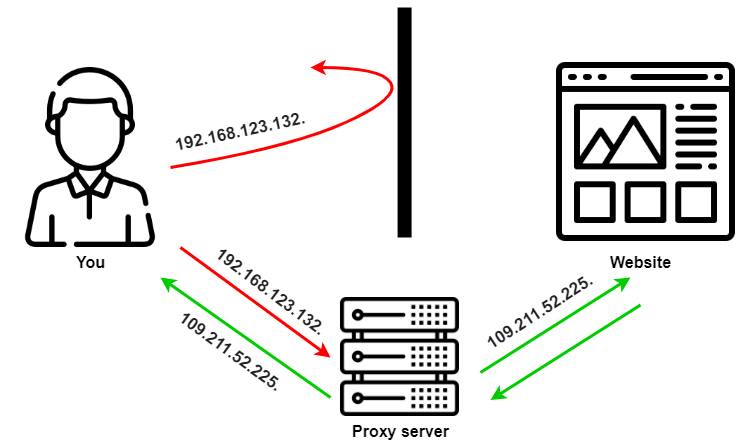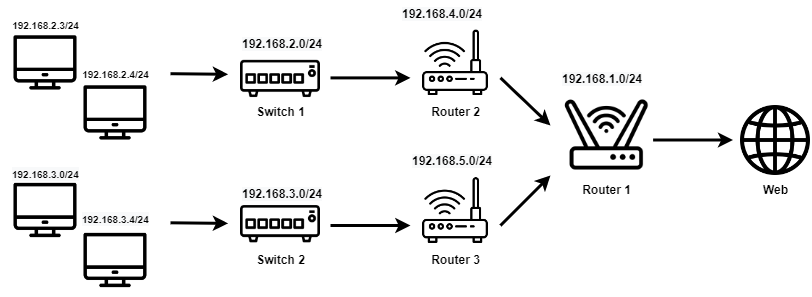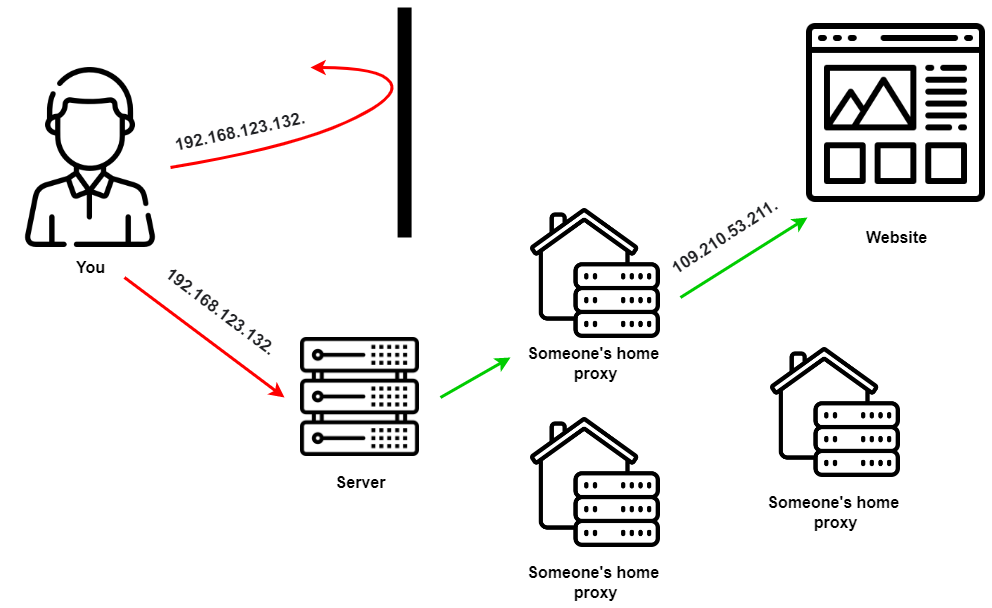How Does a Datacenter Proxy Work, and Why Do You Need One?
- Oct 10, 2022, 6:48 PM
- 8 minutes
The choice of proxy depends on the task. Residential Proxies allow you to surf the Web as a real user and scrape data. Mobile proxies make it look like you access the internet via a cell phone. But data center proxies are the most common type of proxy.
A data center proxy is one of the cheapest and most affordable options to hide your real IP address and keep your network safe. This article will explain how data center proxies work and why you need them.
What Are Datacenter Proxies?
A data center proxy serves as an intermediary between a user and the internet. It receives data and forwards it to the client.

IP addresses for data center proxies are obtained from companies and data centers. Typically, providers use cloud services, such as Google Cloud, OVH, or Amazon Web services.
Many security systems can detect and then block your datacenter connection. That is why data center proxies are not suitable for all tasks. For example, they cannot help you buy a limited edition clothing collection or it can be difficult for them to scrape data. In this case, you should use residential proxies. Their IP addresses are associated with the ISP and the actual device.
Types of Datacenter proxies
Shared. Several people use the same IP address simultaneously. They are cheaper than private ones, but the risk of being blocked is higher.
Private. It means that only one person uses a proxy. The risk of blocking is lower.
Types of Protocols
HTTP proxies change the user’s IP but do not provide a secure connection. All user activity is visible as if they were not using a proxy.
HTTPS proxies are the same as HTTP proxies but with encryption. They help to establish a secure connection.
SOCKS4 proxies offer better security than HTTP proxies. They hide the user's IP address and the fact that a person is making a request through a proxy. SOCKS4 establishes a TCP/IP connection to any address or port.
SOCKS5 proxies are similar to SOCKS4 proxies, but the former supports the UDP protocol. SOCKS5 can make DNS requests through a proxy and use the BIND method to open a port for incoming connections.
Advantages of Datacenter Proxies
Low price. Every provider offers different prices. Some data center proxies cost $0.50/GB or $0.60/IP on the US market.
By comparison, the more expensive plans of mobile residential proxies begin at $3/GB. There is no option to purchase IP.
Free proxies are usually located in data centers.
High speed. The connection speed increases because cloud servers and data centers are connected to fast internet.
Stability. The servers for data center proxies are available 24/7 and are monitored by engineers. If something happens to the server, the specialists will fix it right away.
A large number of IP addresses. Data center proxy providers offer between 2000 and 20,000 IP addresses. Therefore, you can always connect to an available IP.
Anonymity. Data center IP addresses are not assigned to ASN (identifying number of the company that issued the IP), so no one can see your real IP.
Disadvantages of Datacenter Proxies
Ban risk. Websites can identify data center proxies and ban it. Sometimes IP addresses get blocked even before the start of sales.
Sometimes providers sell the same IP addresses to several clients because they can make more money. As a result, the large number of requests causes IP bans, and there is no point in using these IPs anymore.
Subnet bans. A subnet is a group of IP addresses. For example, one router in the subnet 192.168.1.1 assigns to all devices IPs from 192.168.1.1 to 192.168.1.255. If website filters detect one address from this subnet, they block the rest.

Few locations. Data center proxy providers usually offer 10-15 locations, while residential proxies have a huge pool of IPs from all over the world depending on the provider.
Data center proxies are not suitable for parsing. Parsing is the data collected from search engines for competitor analysis. With parsing, it is easy to identify the market leaders in search engines for further SEO optimization of your website. The probability of getting banned increases if you parse using data center proxy. Anti-bot filters have learned to recognize such addresses and block them. Therefore, residential proxies are preferable for parsing.
Datacenter Vs. Residential Proxies
You can use both types for the same purposes: changing IP, secure connection, and safe network. They use the same principles to operate but have different sources of origin.
Residential proxies providers offer IP addresses borrowed from real users, and you can use them to access the destination resource.
Residential proxies are provided by Internet Service Providers (ISPs), so it is impossible to reach complete anonymity: Internet providers know your real IP and the issued one.

Lower speed. Residential proxies are assigned to real devices. Therefore, your internet speed depends on that of the person to which you are connected.
Residential proxies offer fewer addresses. Residential proxy providers promise 100 million IP addresses in their ads. In reality, the number of available IP addresses is far fewer: some devices can be not connected to the internet. But marketers take all IP addresses into account for their materials.
Residential proxies are less reliable. The peer can disconnect at any time, and your connection will be lost.
Residential proxies have more legitimacy. Residential IPs do not differ from real user IPs. Even if a website identifies a residential proxy, it will not block it because it can be a real user. A website can lose its audience if it blocks the residential proxy. That’s why residential proxies are good for data scraping.
Let's compare a data center and residential proxy.
Why Do You Need a Datacenter Proxy?
Buying goods. For example, an online shop sells limited edition sportswear or sports shoes only in Turkey. With a data center proxy, anyone outside Turkey can get access to these goods.
Ad Confirmation. Proxies will help check that ad campaigns you have set up to target audiences from different locations are displayed correctly. For example, you are running an ad campaign in Latin America. With datacenter proxy, you can see the ad as if you were living in Brazil.
Access Geo-Restricted Content. Some websites are blocked in some countries. To access these websites, you can connect to servers in locations where it is not banned by using residential proxies.
Scrape data. Companies use proxies to scrape public web data to have up-to-date information about their target market. Sometimes websites block access to this data to comply with the legal requirements of different countries. Datacenter proxies work around geo-blocked content and help to scrape data.
Keep track of competitors. This is one of the main tasks of web scraping. The prices can change several times a day in online stores, especially during peak sales periods. That is why it is crucial to monitor these changes in real-time. Datacenter proxies mask your IP address when you are tracking competitors’ product prices, so they do not detect and block you.
Detect Ad Fraud. Fraudsters might offer to place ads on foreign websites with a real audience, but they put them on local websites in irrelevant locations instead. So, companies use data center proxies to verify ads they cannot see from the current location.
Social Media Management. Social Media platforms ban the accounts performing many activities under the same IP address. Data center 4g lte proxies are used to promote accounts on social media: one proxy is assigned to one account.
Traffic arbitrage. You can get banned if you work on Facebook* Ad manager or Google AdWords using the same IP address. To avoid this, you need to use a datacenter proxy.
Use instead of VPN. Some countries block VPN services. For example, VPNs are illegal in China, Egypt, Iran, Iraq, and Israel. Datacenter proxies work the same as VPNs, but they do not get blocked by governments.
Marketing research. Switching between datacenter proxies located in different countries, you can see the bigger picture.
Anonymity. A datacenter proxy provides many IP addresses which are not linked to your real IP.
Bypass blocking and maintain high-speed connectivity. For example, when you need to process constant data flow in real time.
When Datacenter Proxies are not the Solution?
If you want to be sure that you will not get banned. Datacenter IP addresses may be blocked even before you get them. Residential proxy blocking is much less common. That’s why they are more suitable for scraping.
If your target website filters IP addresses. For example, if the website allows only the IP addresses of mobile or home Internet service providers. In this case, choose residential proxies.
Conclusion
Datacenter proxies change your IP address and location on the Web.
Datacenter proxies are hosted on servers of various providers. They are fast and reliable but are not suitable for all tasks. Many websites can identify and block datacenter proxies. So, you can bypass geo-blocking or secure your traffic with datacenter proxies, but you cannot scrape websites.
Are you looking for a proxy? Try out our free mobile proxies— a specialized type of residential proxies.
* — restricted in Russia
In OnlineProxy you will find mobile proxies from all over the world with daily billing from $0.7 and IP rotation. Proxies are great for work tasks. We guarantee quality or refund money.